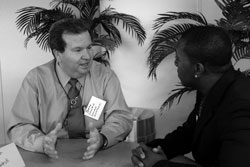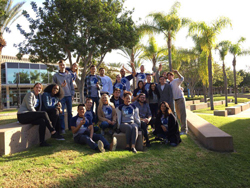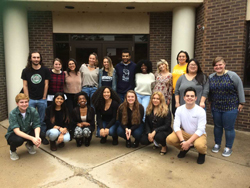“Welcome to McDonalds, can I take your order?” This is a phrase we all fear after spending the past four years doing all of the right things in college with hopes that a job will appear after graduation.
It was reported by the American Department of Labor on February 1 that there are 12.3 million unemployed people in the United States. The unemployment rate is 7.9 percent and has been near that level since September 2012.
The media has overwhelmingly continued to report on the unemployment rate among college graduates. A New York Times editorial from June 2012 said that in the past year, unemployment among college graduates under age 25 has averaged 8.5 percent. This is an improvement from 9.5 percent in 2011, but still much higher than 5.4 percent in the year before the Great Recession struck at the end of 2007.
Though the unemployment rate in America remains high, statistics show that the University graduates are beating the odds. William Hill, Assistant Dean of Career Services, said that of those who sought employment, nearly half, or 46 percent, of the class of 2012 had a job within a month or less. Within four months, 80 percent of those seeking employment had found a job. Only eight percent reported taking six months or more to find a job.
“I think if you’re persistent in looking for a job and you market yourself the right way, the employment rate shouldn’t affect you,” said Bryan Larco, senior. Larco has a job offer prepared upon graduation in May 2013 at Plymouth Rock, an insurance company.
The 2012 statistics improved in comparison to the previous year. Hill said that about 43 percent of the graduates were working full-time, 40 percent were attending or planning to attend graduate school, five percent had other plans (such as traveling or pursuing other interests), and 13 percent were actively seeking a job at the time of the survey.
Many students find themselves worried about searching for jobs, although the University provides students with resources to make the job search less painful. Michael Douglas, alumnus, landed himself a job immediately after graduation. “Career Services definitely helped me out a lot,” said Douglas. “They read over my resume and made calls to companies I wouldn’t think of pursuing.”
Douglas began his job search on his own and was unsuccessful. “I think the fact that I tried to do a lot on my own hurt me in a way,” said Douglas. “Career Services had all the resources available to me, but I kind of went out on my own at times.”
The University provides numerous events, classes and opportunities to assist students through their career search process. The Career Services department hosts career days, workshops and seminars on career skills, one-on-one career advising, interview coaching, and resume preparation assistance. They also send out newsletters to inform students of available jobs each month. Their one-credit Career Search class (LC300) is also another resource for students to become efficient in job preparation.
Hill said, “We are one of the few schools to regularly send active job postings, both full and part-time, directly to students’ email accounts.”
Most colleges force students to check listings on the school website, Hill continued. “Career Services forwards nearly 2000 job listings a year directly to students.”
The University completes the long and rigorous job search process for us. It then becomes our job to take the job listings and use them wisely. “I think MU can only help to an extent and then it’s your responsibility,” said Larco.
The resources that the University supplies will only take one so far, however. It is the responsibility of the students to apply themselves and transform their first job into a reality. “I definitely advise the graduating students to start searching early,” said Douglas. “Utilize all resources that the University has to offer and travel down various avenues for a career because you never know what will interest you.”
Douglas concludes, “Monmouth gives you the blueprint, but it’s up to you to create opportunities for success.”




